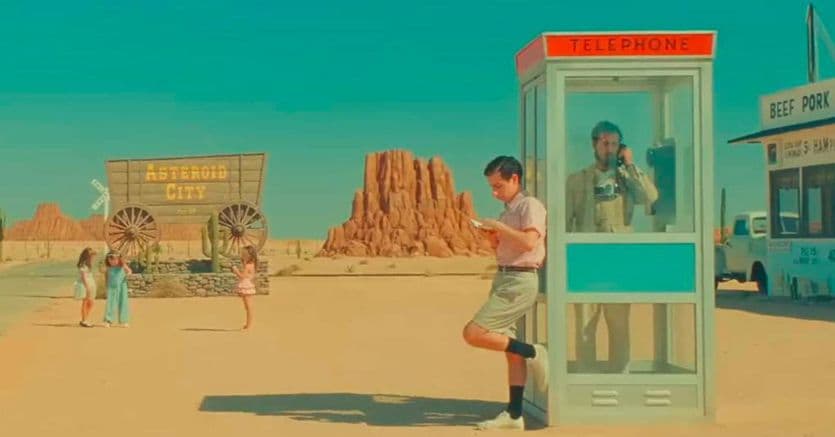Listen to the audio version of the article
Wes Anderson is the protagonist of the weekend in theaters: after the masterclass held at the last Venice Film Festival, where he presented “The Marvelous Story of Henry Sugar”, the American director returns to the center of the national film news for the release of “Asteroid City”, one of the most anticipated new releases of the week.
Presented in competition at this year’s Cannes Film Festival, the film is set in an imaginary and remote American desert town, where an astronomy conference, known as Junior Stargazer, takes place. The convention attracts several students and their parents, but very soon the stories of these characters will end up overlapping in completely unexpected ways.
Mixing westerns and science fiction, Wes Anderson creates an undoubtedly curious film, different in many narrative elements from his previous films, but completely consistent with the rest of his career in terms of stylistic choices, between perfectly symmetrical images and precise and regular camera movements .
Attention to the construction of shots is always at the forefront of the American director’s thoughts and this is also confirmed by this feature film in which, among the many recognizable aspects of Anderson’s cinema, there is also the presence of the usual all-star cast: from Jason Schwartzman (one of the author’s favorite actors) to Margot Robbie, through Scarlett Johansson, Tilda Swinton, Tom Hanks, there are so many well-known faces in this collective story.
“Asteroid City” and the other films of the week
Photogallery4 foto
View
A game of Chinese boxes
Two years after “The French Dispatch”, Wes Anderson continues to give life to an increasingly abstract and theoretical cinema, using continuous games of Chinese boxes on the narrative side which make his films very complex and stratified. If the film is appreciated for his irony and staging, while the dramaturgical side is less successful, as is the conceptual basis of the operation, decidedly more watered down than that of his previous film. What remains are the elegant aesthetics and a series of non-trivial reflections on fears collective (the atomic bomb) and individual (solitude) of the human being, but in the general plan something creaks and in the long run the game between reality and fiction also risks tiring. Like all of the director’s works, however, “Asteroid City” it is however a product to be seen and interpreted, an intelligent film albeit the victim of too many passages that have already been seen to be able to be considered fully successful.
The Palace
Among the new releases in theaters there is also “The Palace”, the new film by Roman Polanski, presented out of competition at the 2023 Venice Film Festival. The title refers to a large hotel located in the middle of a Swiss valley, where Every year rich and spoiled guests converge from all over the world. The New Year’s Eve 2000 party brought them all together to celebrate the arrival of the new millennium: at the service of their extravagant needs there is a bevy of waiters, porters, cooks and receptionists, ready to do practically anything to please them. Four years after the beautiful “An Officer and a Spy”, Roman Polanski is back behind the camera for a grotesque divertissement focused on that bourgeois hypocrisy that he has often talked about in the past: from “The Knife in the Water”, his debut in 1962, to “Carnage” (2011), passing through the little-known “Che?”. The great director of masterpieces such as “Rosemary’s Baby” and “Chinatown” focuses on the fear of the Millennium Bug and on the “apocalypse”, symbolically speaking, which however arrived in a moral sense due to various factors that the film recounts: among these, Putin’s rise to power in Russia. One perceives that on paper the film is an operation full of considerable stimuli, but in its rendering the film unfortunately it gets lost due to too many crude and forcefully foolish passages which do not help the final result. There is no lack of funny and surreal moments at the right point, but Polanski’s touch is rarely felt and the feeling is that of having witnessed an occasion almost completely wasted. From an author like him it was reasonable to expect much more.
